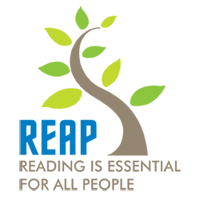There’s a reading crisis in education.
Students are leaving school—some even graduating—without learning to read.
- 39% of Georgia 4th graders—more than 40,000—can’t read at a basic level. 68% can’t read proficiently.
- Kids who can’t read proficiently by 3rd grade are 4 times more likely to drop out of high school.
- Struggling readers are more likely to be underemployed, unemployed, or even go to jail.
Why is reading proficiency so important?
Students who don’t read proficiently will face many challenges in life…maybe dropping out of high school or college, then struggling to find or keep a job.
As an adult, reading proficiency is required to read and comprehend:
- College textbooks
- Job applications and professional exams
- Insurance benefits and credit card contracts
- Tax forms and loan applications
- Safety manuals

Early reading instruction is critical.
It’s crucial for a child’s educational development that he or she become a proficient reader by the end of third grade.
Why? Beginning in fourth grade, children must read to learn other subjects.
An estimated 15-20% of students struggle with reading, which impacts their ability to succeed in math, history, science and language, making it difficult to keep up with the demands of high school and college.
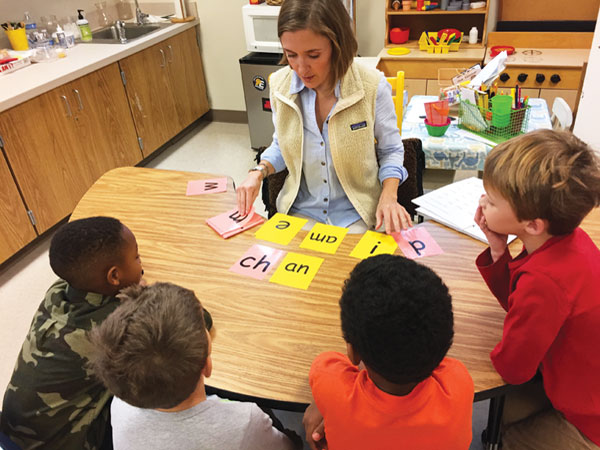
Why do kids struggle with reading?
There are many reasons kids struggle to read:
- Learning disabilities such as dyslexia
- Challenges with focus or attention
- Learning English as a second language (ESOL)
- Limited exposure to books and language
The good news is that 95% of these kids can become successful readers with the right kind of instruction.
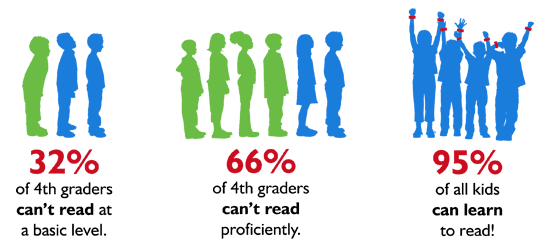
Teachers want to know how to help
There are struggling readers in every public school, yet many teachers don’t know how to help them. It’s hard to believe, but most teachers leave college without the tools they need to effectively teach reading. Struggling readers fall through the cracks. Illiterate kids get passed to the next grade with the hope that maybe the next teacher can help them. Public educators are desperate for ways to ensure that all students leave elementary school with the foundational reading skills necessary to reach graduation.
“I never knew that I didn’t know how to teach reading. I am amazed. I cannot put into words how much this has helped me as an educator and as a person.”
Why are kids failing to learn?
“Scientific research has shown how children learn to read and how they should be taught. But many educators don’t know the science and, in some cases, actively resist it. As a result, millions of kids are being set up to fail.”
APM Reports published a groundbreaking report and podcast that explore the reasons why kids are not learning to read. It outlines the problem with “Balanced Literacy” and explains the science of reading. The report demonstrates how reading performance improved dramatically in the Bethlehem school district (Pennsylvania) after teachers received training in the science of reading.
Hard Words: Why American kids aren’t being taught to read by APM Reports
https://www.apmreports.org/story/2018/09/10/hard-words-why-american-kids-arent-being-taught-to-read
What’s the solution?
We’re teaching the teachers to build stronger readers.
REAP is breaking the mold when it comes to reading instruction in public schools. We train public school teachers to effectively teach reading. We give them the tools they need to turn struggling readers into strong readers with skills that prepare them for school, careers, and a brighter future.
“I wish I could go back and apologize to the struggling readers I taught in the first 12 years of my teaching career…I now know ways to help them and I know they will be successful!”
Structured Literacy is the solution
REAP provides teachers with specialized training in the foundations of reading instruction called Structured Literacy.
Teachers learn scientifically proven, evidence-based approaches that improve reading proficiency in all children. These training approaches are helpful for any child, in any classroom, small group, or one-on-one situation, and are especially critical for struggling readers.
Not only do these strategies help struggling readers to succeed, but they push strong readers to be even stronger. It’s a win-win.
Read more about Structured Literacy
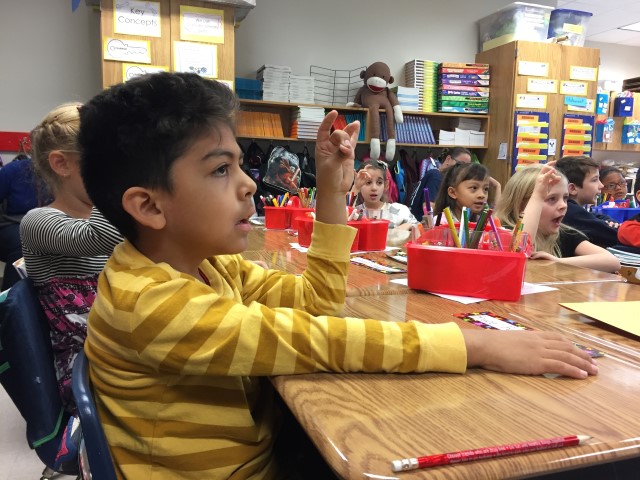
“Right away I saw the difference it was making in my students who had struggled greatly to learn and remember the sounds. This training will make such a huge difference for my students. It already has.”
“All teachers deserve to know about this approach. Without it, many students will slip through the cracks or move up the grades without the appropriate reading assistance to be successful readers.”
Did you know?
One teacher reaches 400 students over a typical career. Since REAP was founded in 2013 we’ve trained almost 850 teachers in metro Atlanta. These teachers have positively impacted the lives of more than 30,000 Georgia public school students and will benefit many thousands more over the years.
The more teachers we train, the more kids we help!
REAP is dedicated to training as many public school teachers as possible. The teachers want it and the students need it. Click here to hear why hundreds of teachers want to take REAP’s training program.
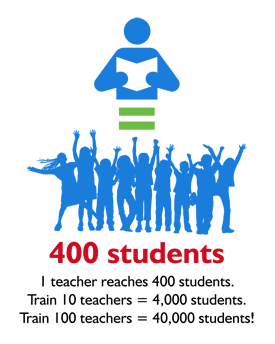
How can you help?
You can make an immediate impact. REAP is a nonprofit organization. We need money to continue providing this crucial training and professional development. We need volunteers. We can’t do it without you, so please check out Donate and How can you help?
You can also help by sharing this knowledge. Let teachers and administrators know about REAP. Tell your friends and family to support REAP and volunteer with our organization to help us make a difference!
